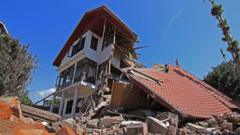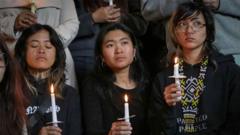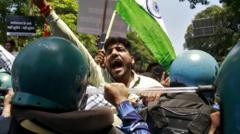In the aftermath of a brutal attack in Kashmir that left 26 people dead, Indian authorities have taken strict measures against alleged militants, including demolishing their homes. This has triggered a wave of detentions and raised concerns about escalating tensions with Pakistan, as both countries exchange accusations and military threats.
Rising Tensions: India Takes Action Following Kashmir Attack

Rising Tensions: India Takes Action Following Kashmir Attack
Authorities in India intensify measures against suspected militants after a deadly attack in Kashmir, leading to demolitions and rising tensions with Pakistan.
Authorities in Indian-administered Kashmir continue to respond vigorously to last week's attack that resulted in the deaths of 26 individuals, allegedly targeting tourists in the region. In an effort to hold those responsible accountable, security forces have demolished the residences of at least ten alleged militants while detaining numerous other individuals for questioning. Explosives have been used to destroy the properties of those reportedly linked to the incident, as the Indian government has not yet named a specific group it holds responsible for the attack. As has become a point of contention, India accuses Pakistan of backing the militants involved, a claim that Islamabad firmly denies.
The attack represents the deadliest violence against civilians in two decades within the contested territory of Kashmir, sparking military tensions along the border as both India and Pakistan have engaged in skirmishes. A significant number of individuals have been detained since the attack near the popular tourist destination of Pahalgam, with authorities reportedly detaining over 1,500 suspects. Despite the severity of the demolitions targeting alleged militants’ homes, prominent regional leaders have voiced concerns that innocent individuals may become collateral damage.
Former Jammu and Kashmir Chief Minister Omar Abdullah and other officials have criticized the demolitions, urging that punitive measures against the guilty should not unjustly impact civilians. Amidst this crisis, certain Kashmiri students outside the region have reported incidents of harassment following the attack.
The Indian police have named three of the four suspected attackers, confirming that two are Pakistanis and one is a local resident, while details about the fourth suspect remain undisclosed. Survivors of the assault claim the attackers were primarily focused on Hindu men. In response, Indian Prime Minister Narendra Modi has promised an exhaustive hunt for those responsible, indicating a readiness to pursue accountability beyond traditional limits.
The implications of this situation have prompted escalations in diplomatic tensions, leading to India suspending the 1960 Indus Waters Treaty, which manages water sharing with Pakistan. Pakistan has retaliated by suspending the 1972 Simla agreement. Trading of fire along the Line of Control has reportedly increased, escalating fears of further conflict.
As international observers, including U.S. and UK officials, call for dialogue and resolution, this acute phase of conflict marks a significant chapter in the long-standing Kashmir dispute, which has historically weighed heavily on India-Pakistan relations.




















